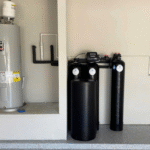If you’ve ever poured yourself a glass of water only to wrinkle your nose at a strong, sulfur-like smell, you know how unsettling it can be. The infamous “rotten egg” odor makes even the cleanest kitchen feel questionable, and it’s not something most of us can just ignore. Water is supposed to be fresh, life-giving, and comforting—not something you avoid because it reeks.
What’s tricky about sulfur water is how sneaky it can be. Sometimes, the smell is barely noticeable, showing up only when the tap runs hot. Other times, it’s overpowering, filling the whole room before you’ve even turned off the faucet. Either way, once you know it’s there, you can’t un-smell it.
The Science Behind That Smell
The culprit here is usually hydrogen sulfide gas, formed naturally when organic matter breaks down underground. Wells and groundwater systems are particularly prone to it. In some cases, sulfur-reducing bacteria inside your pipes or water heater amplify the issue. The result? That unforgettable “rotten egg” scent.
What’s important to know is that, while sulfur in your water isn’t usually harmful at typical levels, it can still be a serious nuisance. It can corrode pipes, discolor fixtures, stain laundry, and, frankly, make you want to avoid drinking your own water. It’s less about danger and more about comfort, quality of life, and peace of mind.
That’s where sulfur water testing and treatment consultation comes in. A professional test not only identifies how much sulfur is present but also pinpoints whether bacteria, chemical reactions, or natural mineral content is to blame. Without testing, you’re just guessing—and when it comes to water, guessing rarely solves the problem.
The Daily Hassle Nobody Talks About
What people don’t always admit is how sulfur water sneaks into everyday life. You invite guests over, and someone comments on the odd smell while washing their hands. You do laundry, and your white towels come out looking faintly discolored. You cook pasta, and even though you try to ignore it, the faint eggy scent lingers in the steam.
These small annoyances add up, especially when they affect how confident you feel about the water in your own home. It’s not just about aesthetics—it’s about feeling comfortable and trusting what flows from your taps.
This is why more homeowners are turning to odor removal water treatment services. These aren’t one-size-fits-all fixes but tailored solutions that take into account the specific cause of the smell in your system. Sometimes it’s as straightforward as aeration, which helps release gases from the water. In other cases, activated carbon filters or chemical treatments like chlorine injection systems are used. It depends on the severity, the source, and your water usage needs.
When a Quick Fix Isn’t Enough
Now, here’s the hard truth: sulfur water problems often aren’t solved overnight. A new filter might help for a while, or a water heater flush might reduce odors temporarily, but without long-term solutions, the issue has a way of creeping back.
That’s where the value of an ongoing sulfur problem water service really shines. Instead of a “set it and forget it” mentality, ongoing service means your system is monitored, maintained, and adjusted as your water conditions change. It’s like having a mechanic for your water—someone who doesn’t just fix things once but keeps them running smoothly over time.
Think of it this way: if you buy a car, you don’t expect one oil change to last forever. The same principle applies to water treatment. Without ongoing attention, small issues can balloon into big ones, and the smell will eventually return. Regular check-ups keep your water clean, your system efficient, and your peace of mind intact.
Real Homes, Real Stories
I once talked with a couple who had dealt with sulfur water for years. They lived just outside of town, relying on a private well. For the longest time, they shrugged it off, thinking it was “just part of country living.” But after one too many ruined laundry loads and a growing reluctance to let friends visit, they finally sought professional help.
The difference, they said, was night and day. Within weeks of installing a proper treatment system and scheduling regular service visits, the odor vanished. Their sinks stayed cleaner, their laundry looked brighter, and most importantly, they felt at ease pouring a glass of water again.
It’s easy to underestimate how much water quality affects your daily life until it changes for the better.
Wrapping It Up
If your water smells like rotten eggs, you’re not imagining it—and you’re definitely not alone. Sulfur water is a common issue, but it doesn’t have to be a permanent one. With the right testing, targeted treatment, and ongoing care, your home’s water can go from unpleasant to refreshing again.
So, the next time you turn on the tap and hesitate, remember: there are solutions out there, and they’re more accessible than you might think. Don’t settle for living with a smell that makes you cringe every time you fill a glass. Clean, odor-free water isn’t a luxury—it’s something every household deserves.



